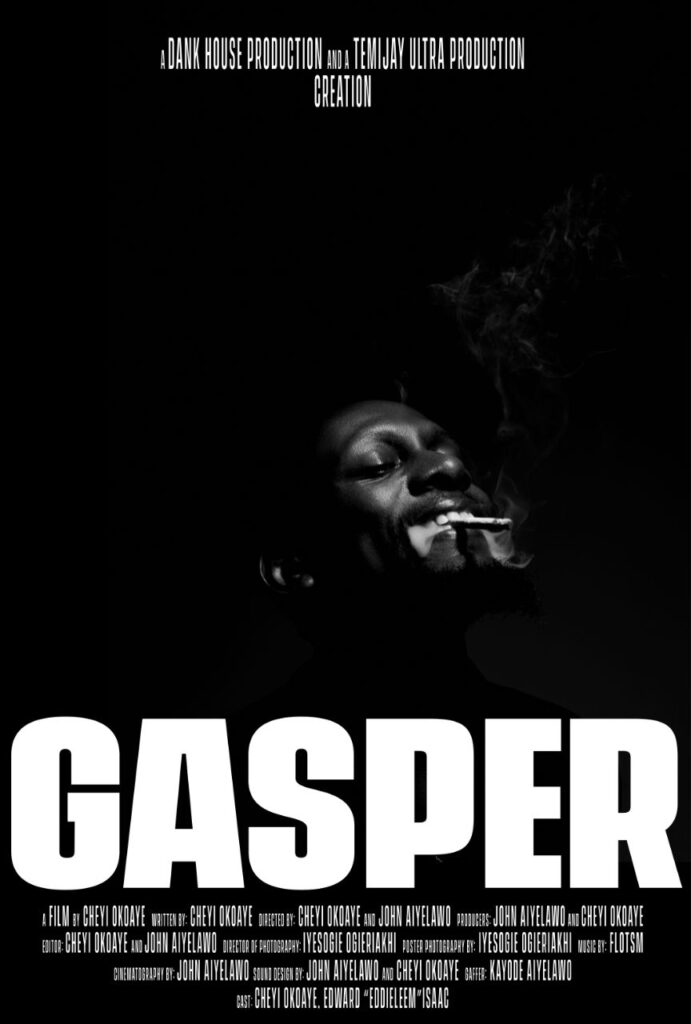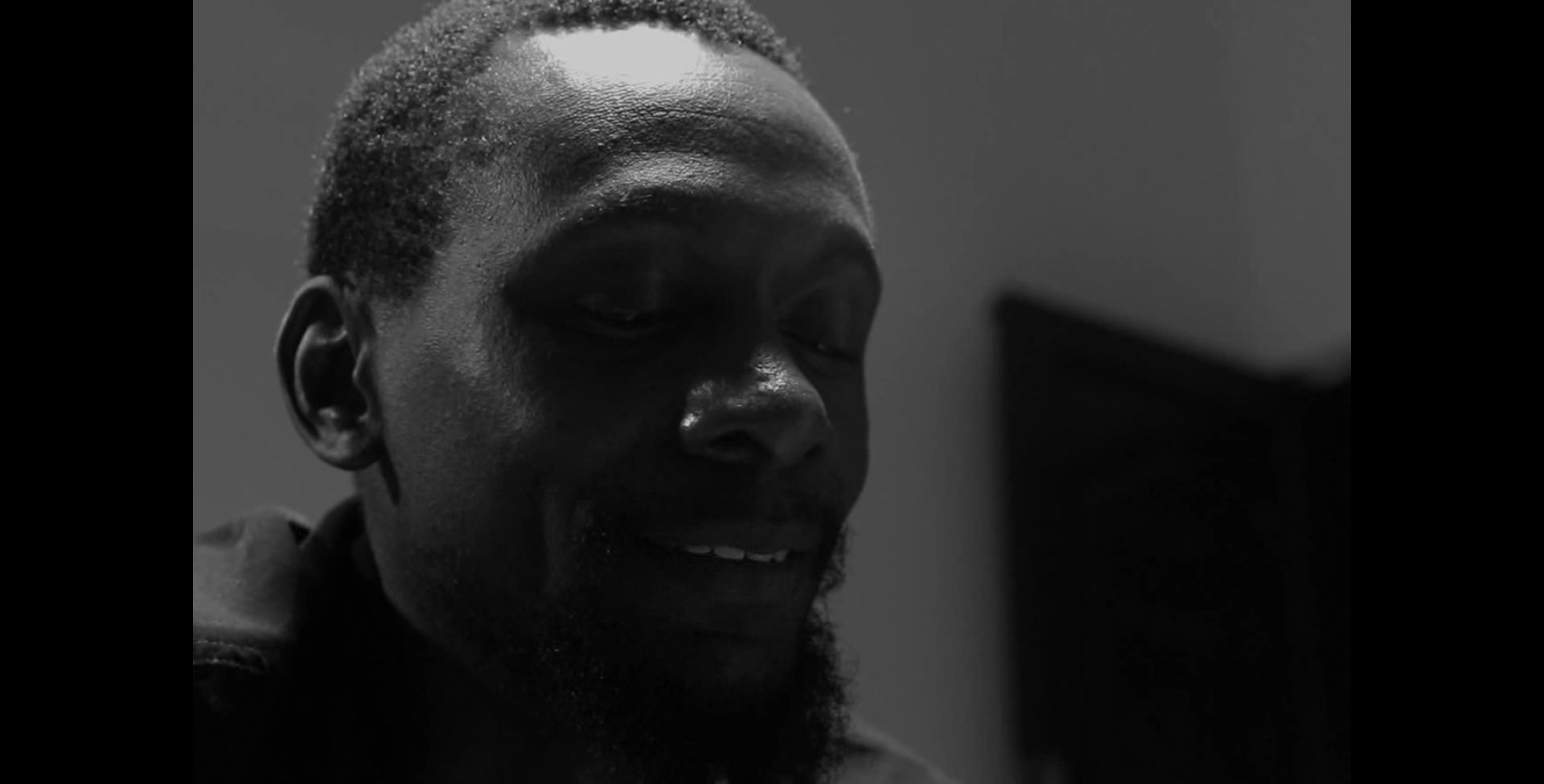I am going to attempt to draw a parallel between the short film, Gasper, and Inland Empire (2006), the last feature film by acclaimed American director, David Lynch. As a critic, I find that sometimes, to better understand a work, I need to think of any other film(s) it reminds me of, and then compare both. It’s a fun exercise to do since cinema is filled with different examples of styles and approaches to trace newly released projects back to.
 First Look: Winifred Iguwa Unveils First Teaser for ‘9TH FLOOR’, Sci-Fi Thriller Short Film
First Look: Winifred Iguwa Unveils First Teaser for ‘9TH FLOOR’, Sci-Fi Thriller Short Film

Gasper, created by Cheyi Okoaye and John Aiyelawo, and written by Cheyi Okoaye, is shot in monochrome, and plays like a one-man show of the titular character monologuing his way through a particularly gruesome night. There is someone sprawled on the floor in a room, mostly unconscious from the looks of it. It is implied that the man, Gasper, has abducted this person to kill them. Why? Well, among other things, Gasper is a psychopath. He speaks to the unconscious person as if all of this is a perfectly normal situation, even calling them, “friend.” However, terrible aside, something sounds off in the way Gasper talks; there is something fundamentally wrong somewhere– the film does not exactly know what it is but invites us for the ride anyway. All we can do is take a peek into the mind of something so existentially sinister. The actor, Cheyi Okoaye, deserves some mention here for embodying such an inhuman (and yet, very human) character with such attention to detail, especially with the voice changes and general mannerisms.
There’s no other way to characterize him, Gasper, the man, is a villain, occupying the same category as other characters such as The Joker from The Dark Knight (2008), Hannibal Lecter from Silence of the Lambs (1991), Patrick Bateman from Mary Harron’s American Psycho, and Arthur Fleck from 2019’s Joker. Gasper is something of a Nigerian psycho, complete with voices in his head, murderous intent, and a complete lack of empathy. At a point in the film, he says, “I hate that word. Empathy…[it] was the last emotion I ever learnt.”
According to this definition, a psychopath is a person who has an egocentric and antisocial personality marked by a lack of remorse for one’s actions, an absence of empathy for others, and often criminal tendencies. Gasper’s lack of empathy is clear, although he seems to feel some guilt. There is a hint of remorse in his monologue, but even if he wants to somehow save himself, he doesn’t know how. There is a voice in his head, a legion, whom he refers to as “the other guy”– an entity which became awakened after his first murder, that of an innocent child. He describes himself as merely a “voice in the other guy’s head,” indicating that at least to an extent, he feels like a passenger going for a plane ride he got tired of ages ago.
 ‘Samaria’ Review: In Cinema, as in Life, Things are Not Always What They Seem
‘Samaria’ Review: In Cinema, as in Life, Things are Not Always What They Seem
 Short Film Review: Biddy-da-dum, ‘BOO’D UP’ Delivers an Engaging Watch
Short Film Review: Biddy-da-dum, ‘BOO’D UP’ Delivers an Engaging Watch
But rather than look for the light, he embraces the darkness, and that is what makes Gasper a tragedy. Similar to how, at the end of Joker (2019), Arthur Fleck, in full acceptance of his dark side, climbs atop a car and dances, basking in the chaos all around him. We love to root for people on screen as they fight their demons. If they, for some reason or another, cannot find a way out and give in to their dark side, then it is sad indeed. Gasper ends with the titular character accepting the legion’s promises of becoming “kings” and “gods” together. We know they are nothing but lies, and we want Gasper to know it too before it’s too late. Gasper, the man, is in trouble. Gasper, the film, is the portrait of the man in trouble.
The phrase, “A Woman in Trouble,” was the tagline for the Lynch film, Inland Empire when it was released back in 2006. In this review, Matthew Curione mentions that it is rare that a simple sentence on a poster describes a picture so well. Also, according to Melissa Anderson, film editor at 4Columns, in her book on Inland Empire, “The most potent précis of Inland Empire remains its tagline: a woman in trouble.”
While watching Gasper, that was the first thing that came to mind. Like in Inland Empire, (and a good number of the projects in David Lynch’s filmography) Gasper seems caught in a web of his own creation he cannot get out of. As is written on the film’s official website, Inland Empire is, simply put, an ugly film that delves deeper into the realms of discomfort than many movie-goers would like. Gasper, too, would be too harrowing for comfort for many audience members.
Still, it is important that cinema turns its gaze to the seemingly horrible and disturbing aspects of the human psyche and human society. Like Gasper, cinema shouldn’t be afraid to delve into the ‘dark’; unlike Gasper, it should go there with a blazing torch in tow.
Share your thoughts in the comments section or on our social media accounts.
Sign Up: Keep track of upcoming films and TV shows on your Google calendar.
Watch the short film below




